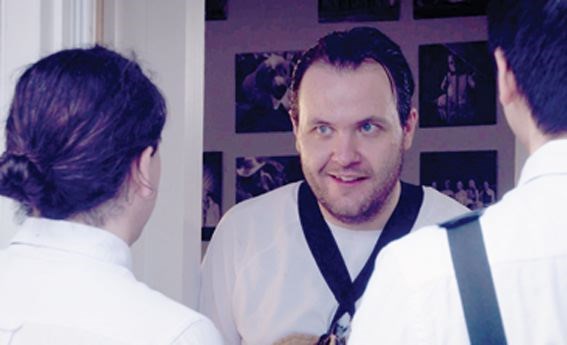The gentle, neighbourhoody streets of Prince George were the scene of a recent horror.
It was sinister. It was gut-churning. It was two young followers of door-knocker Christianity coming to a doorbell near you.
This is the opening scene of the latest Picaroon Pictures short-film. It is entitled The Jahovah Witnessed, directed by Jon Chuby. Like the twisted title, it suggests one thing, but the underlying messages are woven a little differently than the surface inferences. Yes, the two main characters are caricatures of the Jehovah Witnesses sect, but they are also symbolic representations of us all as we allow and even naively participate as a society in sad, tragic, horrible goings on. The victims, the film suggests, are all too often women.
As a society, we make excuses, we go along to get along, cede our will to naivety or unfounded beliefs, we are willfully blind at times, and as an overall public we are a complex combination of golden intentions, strong but trapped, and murderously sick in the head.
Yet the social commentary within this 11-minute little film was entirely framed in humour.
Well. Almost entirely. There was the small matter of a homicidal maniac and an imprisoned young woman in his basement.
Comedic horror is a frequent genre used by Chuby. So frequent, in fact, that it's a wonder that The Jahovah Witnessed even got made.
Chuby was in the midst of shooting his television show co-production Geoff & The Ninja, while simultaneously doing post-production work on another Picaroon short-film with the working title Clown Alley. The Jahovah Witnessed was an unscheduled side project of a side project. Chuby and his filmmaker friends just got caught up in a spontaneous storytelling mood and had to get it off their chests.
"We wrote that in a single night and just filmed it with almost no planning," Chuby said. His co-writer was Shaun Christy. Chuby makes a brief on-screen cameo as a neighbour fleeing the oncoming evangelists, but Christy has a substantial role as the disturbed villain of the story.
Chuby and Evan James Ollenberger handled the camera work with sound and lighting done by Cale Robert Toews, Devon Todor Kavanagh, and Adam Harasimiuk.
It is a collection of familiar names in the Picaroon Pictures family. This film was only possible because of close-at-hand creative allies. The only other acting was done by Neil Brooks and Bradley Charles portraying the nerdy door-to-door religious messengers and Jasmine Eadie in her screen debut portraying the kidnap victim in the basement.
She, too, was close at hand despite never having acted in a movie project before. It was only a couple of years ago that she made her stage debut but that introductory experience was in UNBC Musical Production's live version The Addams Family, in which Brooks and Charles were also cast.
Other stage credits followed for Eadie, but this was a first, and the despite the nearly constant smear of humour, she was called upon for the script's heaviest emotional loads.
"You know how dark films often have comedic relief? My character was sort of the opposite," she explained. "While this film is comedy/horror the heart of it is comedy. My part is a bit more serious and so I tried to keep it as real as I could and put myself in that situation without making it campy. There was enough of that already from the other characters and so if I were to be that way as well, it would have been too much."
Despite being tied roughly to a chair in a dank basement surrounded by saws, augers and axes, the entire situation was a lot of fun, Eadie said. She had a good time with the guerilla-style filming process.
"I learned quickly that it was very different from theatre acting," she said. "In theatre you often make things big and over exaggerated so your expressions can be seen by audience members from a distance. But when there's a camera, there's no need for that, and can make a scene ungenuine. I also had to learn to alter my pacing, on the stage you're always in view and can move and speak with what naturally fits the scene. In a film however, you have to make sure the angle works for the camera and that you are moving at a pace that the camera can keep up with, and put more trust in editing for the flow of the scene. I must say, though, being able to do multiple takes is awesome. You have more room to try out a scene and alter or add to it if you need to. For instance I didn't have any lines originally, but we thought it would be funny if I said something in the heat of the fight scene. And I think that little moment of humour in the midst of all the action worked out great."
It was only three words. Two, actually, but one got repeated. They might be the three-syllable highlight of the entire film - the kind of utterance that gets made into a T-shirt.
To enjoy all the satirical frivolity, or be revolted by the underlying truths, you can watch The Jahovah Witnessed anytime on the online Vimeo viewing channel free of charge.



